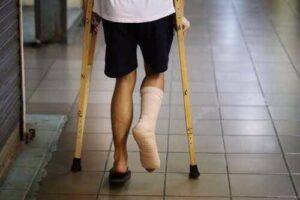Suffering a personal injury can be a physically, emotionally, and financially challenging experience. If you believe that your injury was a result of someone else’s negligence, it’s essential to understand how to prove negligence in a personal injury case. This blog post will specifically focus on the process of proving negligence in a Kansas personal injury case, offering valuable insights and guidance for individuals seeking justice and fair compensation.
Understanding Negligence:
Negligence, in legal terms, refers to the failure to exercise reasonable care, resulting in harm or injury to another person. In a Kansas personal injury case, proving negligence requires establishing four key elements:
- Duty of Care: The first step is to show that the defendant owed you a duty of care. This means that they had a legal obligation to act reasonably and responsibly to prevent harm.
- Breach of Duty: Next, you must demonstrate that the defendant breached their duty of care by failing to act as a reasonable person would have under similar circumstances. This breach of duty is a critical element in establishing negligence.
- Causation: It’s crucial to establish a direct link between the defendant’s breach of duty and your injuries. This involves proving that their negligent actions or inactions directly caused your harm.
- Damages: Finally, you must provide evidence of the damages you suffered as a result of the defendant’s negligence. This can include medical bills, lost wages, pain and suffering, and other related losses.
Collecting Evidence:
To strengthen your case and prove negligence, gathering relevant evidence is paramount. Consider the following steps:
- Medical Records: Obtain comprehensive medical records detailing your injuries, treatment, and ongoing healthcare needs. These records serve as crucial evidence connecting your injuries to the incident.
- Eyewitness Testimony: If there were witnesses to the incident, gather their contact information. Eyewitness testimony can provide crucial support in proving negligence.
- Photographs and Documentation: Take photographs of the accident scene, property damage, and any visible injuries. Additionally, keep a record of any relevant documents, such as incident reports or insurance communications.
- Expert Witnesses: In complex personal injury cases, consulting expert witnesses, such as accident reconstruction specialists or medical professionals, can provide specialized knowledge and strengthen your case.
Seeking legal representation:
Navigating the legal process can be complex, especially when dealing with personal injury claims. Hiring an experienced personal injury attorney in Kansas is highly recommended. An attorney will guide you through the legal proceedings, ensure your rights are protected, and help you build a strong case by gathering evidence, interviewing witnesses, and negotiating with insurance companies.
Filing a Lawsuit:
If a settlement cannot be reached through negotiations or alternative dispute resolution methods, filing a lawsuit may be necessary. Your attorney will file the lawsuit on your behalf, initiating the formal legal process. It’s important to note that Kansas has a statute of limitations for personal injury cases, typically two years from the date of the injury. Prompt action is crucial to preserve your rights.
Settlement or Trial:
During the litigation process, your attorney will engage in negotiations with the opposing party or their insurance company to reach a fair settlement. If a settlement cannot be reached, the case may proceed to trial, where a judge or jury will decide the outcome based on the evidence presented.
Comparative Fault in Kansas:
It’s important to understand the concept of comparative fault in Kansas personal injury cases. Kansas follows a modified comparative negligence rule, which means that your compensation may be reduced if you are found partially responsible for the accident. If you are deemed to be 50% or more at fault, you may be barred from recovering any compensation.
Your attorney will work to gather evidence that proves the defendant’s majority share of fault while minimizing any potential arguments of comparative negligence against you.
The Importance of Documentation and Record-Keeping:
Throughout your personal injury case, maintaining detailed records is crucial. Keep track of all relevant documents, such as medical bills, receipts, correspondence with insurance companies, and any other evidence related to the incident. This documentation will serve as valuable evidence to support your claim and prove negligence.
Stay Patient and Persistent:
Personal injury cases can be lengthy and complex. It’s essential to stay patient and persistent throughout the process. Trust your attorney’s guidance and expertise while actively participating in the case’s progress. Keep open lines of communication with your attorney and provide them with any updates or new information that may arise.
Proving negligence in a Kansas personal injury case requires a strategic and thorough approach. By understanding the legal elements, gathering strong evidence, seeking professional legal representation, and presenting a compelling case, you can increase your chances of successfully proving negligence and obtaining fair compensation. Remember to consult with an experienced personal injury attorney to ensure your rights are protected and to navigate the legal process effectively. With diligence and perseverance, justice can be served, bringing you the compensation you deserve for your injuries and losses.
At Melinda Young, we specialize in handling personal injury cases in Kansas and understand the complexities involved in proving negligence. Our experienced team of attorneys is dedicated to providing comprehensive legal assistance to help you navigate the process and maximize your chances of success. Here’s how we can help:
Expert Legal Guidance: We have a deep understanding of Kansas personal injury laws and the specific requirements for proving negligence in these cases. We will guide you through the legal process, ensuring you understand your rights and options at every step.
Case Evaluation: Our team will thoroughly evaluate your case to determine the strength of your claim. We will assess the evidence available, consult with experts when necessary, and provide an honest assessment of your chances of proving negligence and recovering compensation.
Evidence Gathering: Proving negligence requires solid evidence. We will assist you in collecting and preserving relevant evidence such as medical records, accident reports, witness statements, and expert opinions. Our attention to detail and experience in handling personal injury cases allows us to build a strong evidentiary foundation.
Expert Witnesses: In complex personal injury cases, expert witnesses can provide invaluable testimony to establish negligence. We have established relationships with reputable experts in various fields who can provide professional opinions and strengthen your case.
Negotiations and Settlements: Our skilled negotiators will handle communications and negotiations with insurance companies and the opposing party on your behalf. We will strive to reach a fair settlement that compensates you adequately for your injuries, damages, and losses.
Trial Representation: If a settlement cannot be reached, we are prepared to represent you in court. Our trial lawyers have extensive experience in litigating personal injury cases and will skillfully present your case, cross-examine witnesses, and advocate for your rights in front of a judge or jury.
Client Advocacy: Throughout the process, we prioritize your needs and interests. We will keep you informed, answer your questions promptly, and provide compassionate support during this challenging time. Your well-being and best possible outcome are our top priorities.
Choosing Melinda Young means having a dedicated legal team by your side, fighting for your rights and tirelessly working to prove negligence in your Kansas personal injury case. We have a proven track record of success and will leverage our expertise and resources to maximize your chances of obtaining the compensation you deserve.
